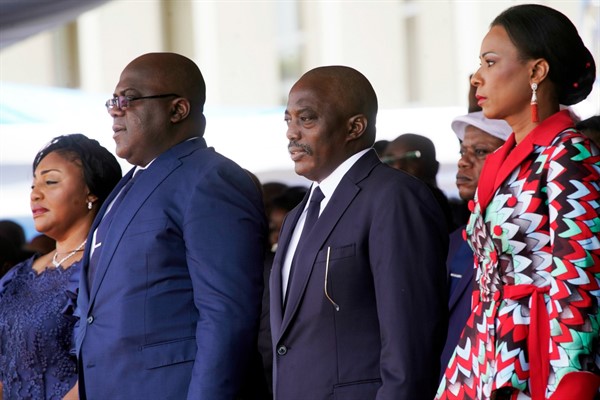Since early 2019, the Democratic Republic of Congo has been governed by an uneasy coalition built around President Felix Tshisekedi and his predecessor, Joseph Kabila, who ruled the country for 18 years until finally agreeing to step down after the 2018 election. Until recently, tensions between Tshisekedi and Kabila only rarely spilled over into public view. But a recent disagreement, over who to appoint as the chair of the Independent National Electoral Commission, has taken the feud to a new level.
In July, the National Assembly—dominated by Kabila’s coalition, the Common Front for Congo, or FCC—nominated Ronsard Malonda, a Kabila ally, to head the electoral commission. While Malonda’s appointment cannot go ahead without Tshisekedi’s signature, the move is typical of Kabila’s attempts to maintain influence over national institutions even after leaving office following elections in December 2018. Those polls, which Malonda helped to oversee as a senior official in the commission, were widely viewed as rigged. Tshisekedi initially ran as an opposition candidate, but was then chosen by Kabila to succeed him after the ruling party failed to push through its first-choice candidate, Emmanuel Ramazani Shadary. Tshisekedi and Kabila then reportedly cut a backroom deal to share power in a coalition government, which has been marked by a power struggle since its inception.
When Tshisekedi’s supporters took to the streets in July to decry what they saw as Kabila’s attempts to impose his decisions on the country, they were tear-gassed and beaten by officers of the National Police, which is packed with Kabila allies. On July 9, security forces forcibly dispersed crowds that had gathered in multiple cities, organized by Tshisekedi’s political party, the Union for Democracy and Social Progrss, to protest Malonda’s nomination. According to the United Nations Human Rights Office, at least two people were killed by security forces—one in the capital, Kinshasa, and one in the southeastern city of Lubumbashi. A police officer was also killed amid the unrest.

